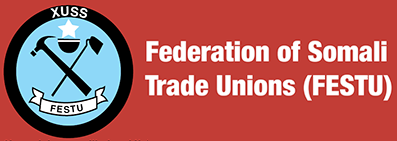The Federation of Somali Trade Unions (FESTU) welcomes the decision of the Prime Minister of the Federal Government of Somalia, Hamza Abdi Barre, to dismiss the former Minister of Labour and Social Affairs, Mr Yusuf Mohamed Adan and to appoint Professor Salim Aliyow Ibrow as his successor.
While it is not customary for FESTU and trade unions in general to comment on government appointments or dismissals, this decision was both necessary and justified. The removal of the former minister is an act of accountability that restores confidence in Somalia’s commitment to protecting the rights and dignity of its workers, as well as preserving social peace and labour relations that have taken root since 2019, when Somalia embraced social dialogue and tripartism, bringing together the government, trade unions and employers in constructive cooperation and consultations.
Since December 2024, FESTU and its affiliated trade unions have been in strong disagreements with the dismissed minister over bilateral labour migration agreements signed with Saudi Arabia. These agreements were concluded despite clear warnings from FESTU that they were not in accordance with international labour standards and that they exposed Somali migrants to grave exploitation and abuse. The agreements also did not comply with the model Bilateral Labour Migration Agreements (BLMAs) established by the African Union, IGAD and the International Labour Organisation (ILO). The dismissed minister also ignored the legal analysis of these agreements conducted by the ILO, which had been requested by his predecessor.
The dispute escalated when FESTU joined 35 national trade union delegations at the 113th session of the International Labour Conference (ILC) in Geneva to submit a formal complaint to the ILO against Saudi Arabia for widespread violations of the human and labour rights of African migrant workers, including Somali nationals. Instead of addressing these concerns in the interest of Somali workers, the dismissed minister chose to defend Saudi Arabia’s position, undermining the trade union movement and effectively aligning himself with those targeting FESTU in reprisals for this complaint.
Such conduct weakened the integrity of the Ministry of Labour and Social Affairs and destabilised the foundations of social dialogue in Somalia. The minister’s actions jeopardised the safety of Somali trade union officials, disrupted tripartite cooperation and harmed the country’s international reputation by prioritising external interests over the welfare of Somali citizens while attacking trade unions on behalf of a foreign government.
FESTU has repeatedly raised these concerns with the President of Somalia, the Prime Minister and other senior government officials. The Prime Minister and FESTU’s General Secretary met again yesterday morning, during which FESTU reiterated its grave concerns about the minister’s conduct and the serious consequences of his decisions, which have caused embarrassment and harm to the country.
FESTU clarifies that it does not oppose Somali workers seeking employment abroad, including in Saudi Arabia. However, we insist that all migrant workers must be protected by fair and lawful agreements that guarantee their rights, freedoms and safety in accordance with international labour standards and that they receive decent pay.
As organised labour, we believe that public officials have a solemn duty to protect and serve their citizens, not to expose them to exploitation or trade away their dignity for personal or political gain. Somalia must never be seen as a country that sells the rights of its people to the highest bidder.
FESTU therefore commends the prime minister for his decisive leadership and calls on the new minister of labour and social affairs, Professor Salim Aliyow Ibrow, to prioritise rebuilding trust with social partners, strengthening social dialogue, maintaining tripartite engagement and ensuring that labour governance in Somalia aligns fully with international standards and the principles of justice, fairness and human dignity.
